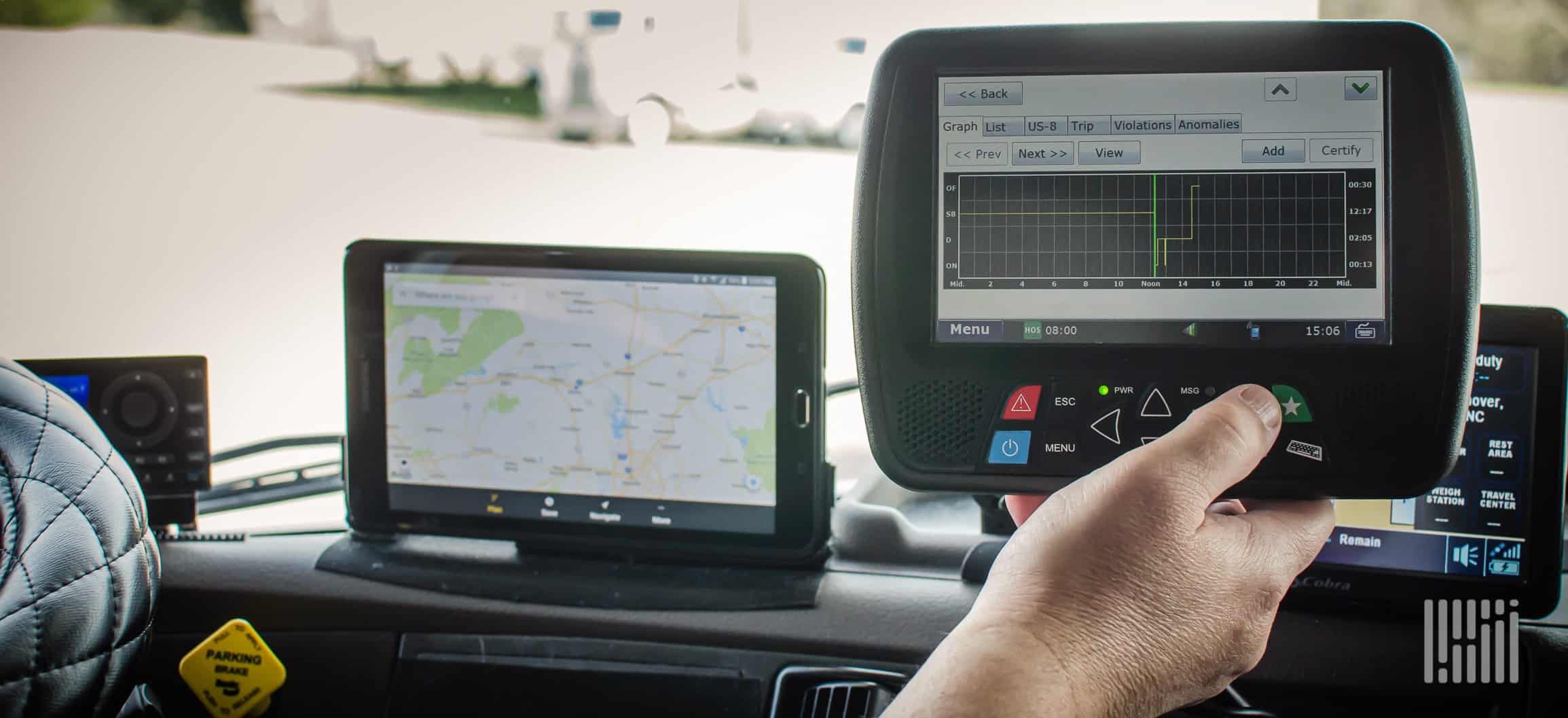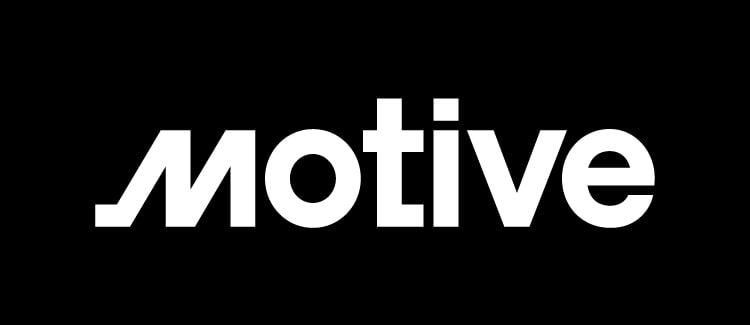As an owner operator, choosing an affordable yet fully-featured ELD is crucial to simplify compliance and improve safety without breaking the bank. We reviewed the top budget-friendly options that provide essential tracking and integrate smoothly with your operations without unnecessary extras that drive up costs.
Whether you’re looking for basic logs, enhanced GPS fleet tracking, or flexible ‘bring your own device’ solutions, this list of the five best ELD systems for 2024 will help you pick the right ELD while keeping tight reins on your expenses.
Quicklook: Best ELD for owner operators on a budget in 2024
- Best for small fleets: Motive
- Best for no monthly subscription fees: Garmin eLog Compliant ELD
- Best for truckers wanting to use their own smart devices: Konexial
- Best for hotshot truckers: Samsara
- Best for features: DriveELD
- Best for reporting: Verizon Connect
Best ELD for owner operators: Budget edition
The best ELD for truckers operating their own vehicles who are on a budget should meet all regulatory requirements without skimping on usability. Here are some of the best ELD devices for this purpose.
Motive
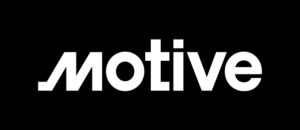
The Motive ELD is one of the best ELD devices for small fleets because it’s so easy to use. Motive simplifies the process of tracking, managing, and sharing hours of service data, reducing administrative burden. Drivers for small fleets with limited resources and personnel can benefit from Motive’s intuitive ELD interface, which requires less training time, enhances productivity, and efficiently ensures regulatory compliance.
Best for: Small fleets
Benefits
- Reduced fuel wastage
- Vehicle diagnostics
- Reduced liabilities
- Location tracking
- Better route management
- HOS alerts
- Quality customer service
Disadvantages
- No international integration
- Annotation notes for edits are difficult for some
- Each driver needs a smart device
Pricing: Plans as low as $25 per month
Garmin
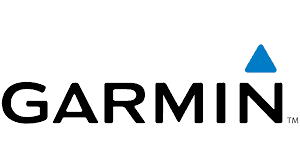
Garmin provides owner-operators with an ELD that does not require an ongoing monthly subscription service. Instead, the Garmin eLog Compliant ELD device only requires the up front hardware fees, then you’re set. It makes tracking your hours of service (HOS) simple and affordable, without the worry of having to commit to monthly subscription plans. The ELD also integrates with Garmin GPS and fleet management tools and offers customizable interfaces and reporting.
Best for: No monthly subscription
Benefits
- Reliable name brand
- No monthly subscriptions
- 24/7 customer support
- Automated recording of HOS
Disadvantages
- No IFTA reporting
- Limited functionality
- Not compatible with OBDII
Pricing: $249.99
Konexial
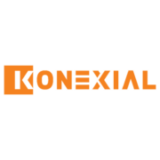
Konexial ELD’s super affordable price point makes it a viable budget-friendly ELD solution for owner operators looking for no-frills compliance and hours tracking. Their ‘bring your own device’ feature allows drivers to use their own tablets or smartphones with their app, reducing upfront hardware costs. Their basic monthly subscription plan is $20 per vehicle, which includes the ELD device and basic compliance monitoring.
Best for: Truckers wanting to use their own smart devices
Special features
- CSA scoring and alerts
- GPS vehicle tracking (add-on $5/month)
- Dashboard and analytics
- Compliance monitoring and notifications
- Android and iOS apps
Benefits
- No long-term contract required
- Easy to use, driver-friendly mobile app
- Good compliance monitoring
- Integrated IFTA reporting
- Bring your own device option saves on hardware costs
Disadvantages
- Lacks more advanced dispatch and fleet management integrations
- Fewer features and customization options compared to premium ELDs
Pricing: $149 per ELD device (or no cost for BYOD), monthly subscription starts at $20/month per vehicle
Samsara

Samsara’s ELD offers many features that hotshot drivers subject to ELD regulations appreciate. It’s one of the most reliable devices on the market, even in areas with limited connectivity. In fact, drivers can use the device as a Wi-Fi hotspot. With easy installation, getting started with Samsara is simple for fleet managers and owner-operators of any skill or ability level. And with low upfront hardware cost around $50 per vehicle. With an intuitive app and real-time tracking, Samsara offers the best ELD for hotshot trucking.
Best for: Hotshot trucking
Benefits
- Real-time GPS tracking
- Routing and dispatching
- Engine diagnostics and fault codes
- Violation alerts and RODS visibility
- Driver behavior reporting
- Fuel tracking
- Optional dashcams
Disadvantages
- Frequent software updates
- Onboard diagnostics (OBD)-only port
Pricing: Monthly plans from $35/vehicle.
DriveELD
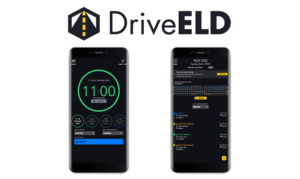
DriveELD hits a great balance point for owner operators focused on minimizing costs but still needing a fully compliant and user-friendly ELD solution. The low-cost plan includes GPS tracking, document management, compliance monitoring, maintenance logs, driving performance reports, and more. It delivers solid features without all the unnecessary extras that drive up costs.
Best for: Generous features
Special features
- Bring your own device options
- GPS tracking
- Truck maintenance reporting
- Document storage
- Driver performance metrics
Benefits
- Very affordable monthly pricing
- No long-term contract required
- Intuitive mobile apps
- Good basic compliance features
- Integrated maintenance logging
Drawbacks
- Limited advanced analytics compared to premium ELDs
- Lacks more complex dispatch and fleet integration capabilities
- Mostly self-service troubleshooting and support
- Cannot edit logs after submission
Pricing: $19.99/month basic plan per vehicle
Verizon Connect

Verizon Connect has emerged as a top choice for owner-operators seeking an affordable and reliable ELD solution in 2024. Their user-friendly platform offers comprehensive reporting capabilities, allowing drivers to effortlessly track and manage their hours of service (HOS) and vehicle diagnostics data.
With its seamless integration and cost-effective pricing, Verizon Connect has become the go-to ELD for budget-conscious owner-operators, particularly excelling in providing detailed reports that ensure compliance and streamline operations.
Best for: Reporting
Features
- Live maps
- Geofencing
- Field service and tracking add-on options
- HOS driver notifications
Benefits
- Simple dashboard for administrators
- Customer support over the phone or online
- Access webinars and online training to get started
- Use driver smartphones to reduce upfront hardware display screen costs
- DVIR to help forecast maintenance and reduce breakdowns
Disadvantages
- Pricing not transparent
- Sales process somewhat intimidating for smaller fleets
- Not a fast compliance solution because of the sales process
Pricing: Only provided via customized quote
What is ELD compliance?
ELD compliance refers to meeting the technical specifications and standards mandated by the Federal Motor Carrier Safety Administration (FMCSA) for commercial vehicles.
The core aspects of ELD compliance include:
- Automatically recording driving time and hours of service data
- Monitoring driver compliance with hours of service regulations
- Supporting roadside data transfer and inspection
- Keeping tamper-proof logs that cannot be edited or deleted
- Having GPS connections to automatically record location, date and time
- Maintaining accuracy in recording driving sessions and duty status
- Providing both standard and alternate means of data transfer
- Resisting manipulation and allowing editing only under certain parameters
ELD providers must self-certify that their devices meet all ELD mandate requirements unless they fall under HOS exemption rules. Compliance ensures the electronic logs can be used to enforce hours of service regulations for greater safety and accountability.
New 14-hour rule for truck drivers
Here’s a quick summary of the new 14-hour rule for truck drivers:
- The new rule went into effect in June 2021 and made changes to the required break after 14 hours of coming on duty.
- Previously, truck drivers were required to take a 30-minute break within the first eight hours of their 14-hour driving window.
- The new rule changes it so drivers must take a 30-minute break after eight hours of time on duty AND before they reach 14 total hours on duty.
- It aims to prevent drivers from postponing their 30-minute break too late into the 14-hour window when fatigue is more likely to set in.
- The 30-minute break still does not count against the 14 hour limit. Drivers still have a full 14 hours of on-duty time.
- The 14-hour limit and 11 hours of driving time per shift stays the same.
So in summary, the new rule enforces the required 30-minute break a bit earlier within the 14-hour on duty window to combat fatigue and enforce proper rest periods for drivers.
Don’t spend too much to find the best ELD for trucks
So, what is the best ELD for owner operator trucking? The key is finding an ELD that complies with ELD mandate HOS rules, and can keep up with any new HOS rules, while fitting within tight budgets. Considering all-inclusive monthly costs versus upfront hardware fees is also important in a search for the best ELD system for trucking. Compare the features you need against the offerings from the best ELD providers on our list, and you’ll be sure to find a good fit for your needs.
FAQ
A truck driver can drive a maximum of 11 hours within a 14-hour work period, after which they must take a mandatory 10-hour break. The driver also cannot exceed 60 hours of driving over seven consecutive days.
The FMCSA hours of service regulations set limits for when and how long commercial truck drivers can operate vehicles to ensure adequate rest between driving shifts for safety, as fatigue is a major cause of accidents.
ELD mandate exemptions include drivers of vehicles older than model year 2000, drivers using paper RODS no more than eight days in any 30 day period, those who conduct drive-away-tow-away operations, and drivers of vehicles requiring special registration.
We are excited to announce the launch of move.freightwaves.com, a revolutionary resource designed to transform how consumers choose auto-shipping companies. Check it out today!

